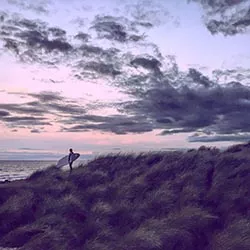
To mark International Women’s Day, Rebecca Bolton, committee member for the UK Women in Geothermal group, shares her enthusiasm about working as a technical lead in Viridien’s geothermal team.
Rebecca, what attracted you to geoscience?
Growing up on the Jurassic coast in southern England certainly put me on the path toward a career in geoscience. It was my playground, with many a weekend spent stomping along the coast paths, climbing on Portland, wondering at the marvels of nature and questioning my surroundings. I knew that studying a STEM subject could lead to a career that could make an impact.
After studying geological oceanography at Bangor University, I was offered a junior role with Fugro Robertson, now Viridien, which meant I could stay in North Wales and progress in geoscience. For the first six years I focused on oil and gas exploration before switching to geothermal as a project geoscientist three years ago.
What do you appreciate the most at Viridien?
I feel very privileged as I am surrounded by some trailblazing geoscientists pushing to see change. It sounds like a cliché, but they are involved for the greater good.
Viridien’s UK geothermal group also bucks the trend in terms of diversity. We are a team of predominantly female geoscientists from a range of backgrounds, from graduates at the start of their career journey to geothermal veterans. Some have transitioned from oil and gas, having diversified their skills into geothermal, while others have hands-on geothermal experience.
This diversity makes the team incredibly agile. Although Viridien has a long legacy in conventional geothermal systems, the new frontiers fall within the sedimentary basins. It is a new market and presents a steep learning curve for many. This is where our multi-faceted team excels. We are quick learners, with our feelers tuned into the markets. We also look beyond the heat and power side of geothermal and study the other cascading and co-production opportunities.
Any challenges along the way?
One of my biggest challenges so far was that transfer of my skills. Although most of my career has focused on oil and gas, I always wanted to move into green energy. When the opportunity came up to work in geothermal, I jumped at the chance. However, although there are similarities between the two resources, there are plenty of differences. The challenge is finding those differences and assessing the knowledge gaps. Talking to peers inside and outside the company has helped steer my development.
In terms of challenges as a woman, I remember a couple of client meetings, quite early on in my career, where the client asked for more older men to attend! So far, I don’t feel my gender has impacted me regarding opportunities or development, but I have seen it affect others. Inequality is still a big issue, which is why it needs to be addressed.
While our team is predominantly women, the picture is rather different in other departments, and Viridien is actively trying to address this. We can see more female leaders and active initiatives to improve our recruiting strategies to appeal to women in the science sector. It is positive to see more women in technical meetings and the female technical community represented in panel discussions and technical presentations.
What motivates you to come to work every day?
In my 10 years as a geoscience professional, I have never felt so enthused or empowered that we can genuinely contribute to positive change. Geoscientists have a significant part to play in tackling the climate crisis, and exploring ways to harness green energy is crucial. The geothermal industry is different from oil and gas; there is more transparency, collaboration and a real sense of camaraderie.

Any advice for other women entering the STEM sector?
First, be inquisitive! If something in a meeting or lecture sparks your interest and you want to find out more, then ask. And if you see an opportunity for development, ask to get involved. It may not happen that time around, but the seed has been planted. Good leadership and positive peer relationships will ensure you get the opportunity to be involved in what interests you.
Second, own your position. Many times, in meetings, I have felt I couldn't contribute or that people wouldn't want to hear what I had to say. We all suffer from imposter syndrome from time to time, but ultimately you are at those meetings because of your role, your experience and what you can contribute. Believe that when you sit in those sessions, your peers want to hear from you.
How important is it to 'show the way’ to other women?
Personally, what is essential for me is to be surrounded by people who inspire me. I could list several teachers, co-workers, athletes, etc. who have positively impacted my life.
We need positive role models who can help nurture the leaders for tomorrow or help us navigate our careers to those more senior roles. If women can clearly see a vision of their future, perhaps in the form of a mentor, who is more seasoned and experienced, that can be powerful.
Being a committee member for the UK Women in Geothermal (WING) group resonates with a statement I love: “A woman alone has power, but collectively we have an impact.” WING promotes the education, professional development and advancement of women in the geothermal community. It’s a wonderful network of like-minded individuals who want geothermal to grow and be an equitable industry. The hope is that, eventually, we will no longer need these groups and that gender equality will be achieved.
For more information on Viridien’s pioneering geothermal services, visit cgg.com/geothermal.
If you are interested in joining Women in Geothermal, visit: Join WING – Women In Geothermal.